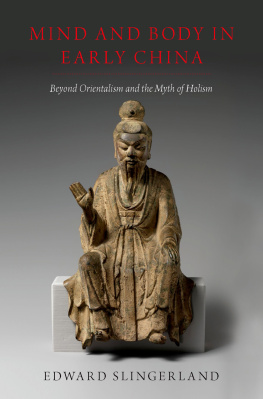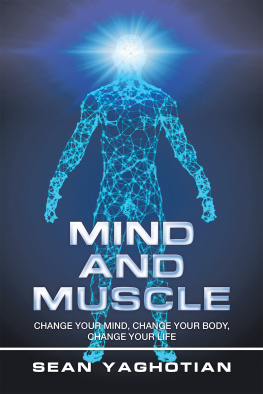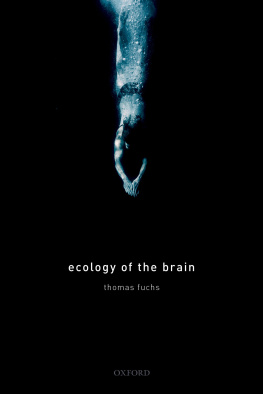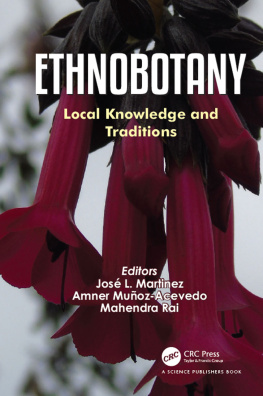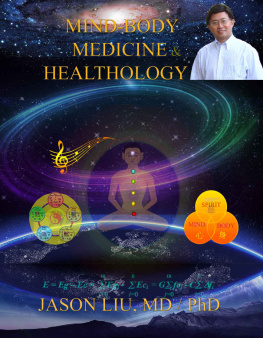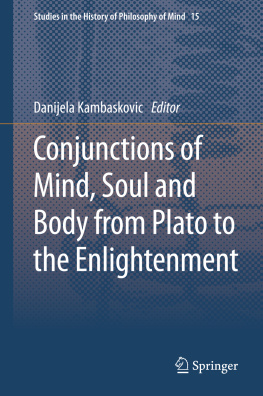Mind and Body in Early China

Oxford University Press is a department of the University of Oxford. It furthers the Universitys objective of excellence in research, scholarship, and education by publishing worldwide. Oxford is a registered trade mark of Oxford University Press in the UK and certain other countries.
Published in the United States of America by Oxford University Press
198 Madison Avenue, New York, NY 10016, United States of America.
Oxford University Press 2019
All rights reserved. No part of this publication may be reproduced, stored in a retrieval system, or transmitted, in any form or by any means, without the prior permission in writing of Oxford University Press, or as expressly permitted by law, by license, or under terms agreed with the appropriate reproduction rights organization. Inquiries concerning reproduction outside the scope of the above should be sent to the Rights Department, Oxford University Press, at the address above.
You must not circulate this work in any other form and you must impose this same condition on any acquirer.
CIP data is on file at the Library of Congress
ISBN 9780190842307
eISBN 9780190842321
Contents
I have been working on this book in one form or another for over a decade. Other projects or commitments have often pulled me away, but have also allowed me to return to the topic with new insights or methods. One consequence of the long gestation of this work is a hazy memory of its development and trajectory. I began speaking about this topic as far back as 2008. Although I made some effort to take notes along the way, writing these acknowledgements in 2018 I am certain to omit or overlook contributions, and for this I apologize in advance.
Over the years, I have benefited greatly from audience feedback at the venues where I have presented aspects of this work, including CaFoscari in Venice (2009), Collge de France (2010), Princeton University (2010), University of Texas Austin (2011), Sun Yat-Sen University, Guangzhou (2011), Aarhus University (2012), University of Chicago (2017), the Central European University in Budapest (2017), Sungkyunkwan University and Chonnam National University in South Korea (2017), Arizona State University (2017), the annual meetings of the American Academy of Religion (2011), Association for Asian Studies (2011 and 2013), American Philosophical Association Annual Meeting (Pacific Division) (2010), International Association for the Cognitive Science of Religion (2011), and Society for Personality and Social Psychology (2011), the International Association for the History of Religion 20th Quinquennial World Congress (2010), the Conference on Theology and Cognition, Religion and Theology Project (Oxford 2010), and the Jacob Marschak Interdisciplinary Colloquium on Mathematics in the Behavioral Sciences, University of California-Los Angeles (2012).
In particular, Id like to thank Paul Goldin, Anne Cheng, Attilio Andreini, Michael Puett, Martin Kern, Ben Elman, Willard Peterson, Joseph Henrich, Ara Norenzayan, ZHU Jing, Haun Saussy, Curie Virg, Hanoch Ben-Yami, Youngsun Back, Randolph Nesse, and Roger Ames for comments that have helped me hone or improve my arguments. Thanks also to Zev Handel for advice on the history of dongxi , Kuan-Yun (Kevin) Huang for help with rendering some lines from the All Things Flow into Physical Form (fanwu liuxing ) text, Kristin Laurin for steering me toward references on individualism and socioeconomic status, and Bruce Rusk for advice on online textual databases. Among my colleagues, my greatest thanks go to Maddalena Poli, who provided detailed comments on the entire manuscript and too many helpful suggestions to individually acknowledge. Intellectual laziness or stubbornness prevented me from adopting all of her suggestions, and she bears no responsibility for remaining errors or omissions. The manuscript was also greatly improved in response to comments from anonymous readers at Oxford University Press; one reader, in particular, provided extremely helpful and detailed feedback and suggestions. Finally, although I entirely disagree with his conclusion and many of his specific claims (as I make clear in the pages below), Pan Daweis recent (2017) critique of my 2013 Journal of the American Academy of Religion article, also in part a response to our conversations in Guangzhou in 2011, forced me to re-think and clarify several aspects of my argument, for which I am grateful.
My literature review was greatly helped by RA assistance from my former students Julia Vorontsova, Allen Chen and Robin Curtis. Robin Curtis also provided RA support in the preparation of the on-line indices and figures and tables for this book, and Clayton Ashton, Jennifer Ritchie and Abraham de Jesus served as the RA coders on our large-scale qualitative text analysis study. It is also important to acknowledge that the quantitative studies first reported in were the result of collaboration with my colleagues Maciej Chudek, Ryan Nichols and Kristoffer Nielbo, with crucial support from Carson Logan, and something far beyond my own capabilities. Ryan Nichols, in particular, kept these projects moving forward. And thanks to Cynthia Read at OUP for her interest in the book, Patterson Lamb for excellent copyediting, and Suganya Elango and Hannah Campeanu for seeing it through production.
Large portions of funded the large-scale, automated textual analysis projects and also allowed Ryan Nichols to spend a year at the University of British Columbia to help with our projects.
Most of the write-up of this book took place in a beautiful study at the Center for Advanced Studies in the Behavioral Sciences (CASBS), where I was an Andrew W. Mellon Foundation Fellow from 2015 to 2016. It was thoroughly enjoyable to return after years of Bay Area exile, and I had months of stimulating and helpful conversations with other CASBS fellows about this project, in particular Chengyang Li, Michael Lempert, Anna Sun, Daniel Bell, Andrew Chignell, Jamie Jones and David Wong. Thanks also to Natasha Iskander (a former Stanford undergrad classmate!) for both friendship and helping me to realize that impenetrably convoluted French prose is sometimes just impenetrably convoluted prose. Finally, innate human promiscuous teleology (see
Translations from Chinese texts cited are my own unless otherwise noted, but they are keyed to the most commonly used English translations in cases where the chapter number alone is not useful or standardized passage numberings are not established (e.g., the Xunzi, Zhuangzi, Lshi Chunqiu). I have not provided references for the Chinese original text because, in my view, the ease of finding Chinese passages instantly through the variety of available online corpora makes the practice common in my graduate school dayskeying Chinese passages to the standard Harvard-Yanching print concordanceobsolete.
: 167).
It is feverish imaginings such as these that frame the myth of Chinese (or more generally Eastern) holism. Holism here refers to an absence of dualisms or dichotomies, such as mind-body, subject-object, or emotion-reason, that are thought to uniquely characterize Western thought. As I argue in the pages below, the Chinese holist myth can be classified as a subspecies of the broader Orientalism so famously documented by Sad (1978). The heady cocktail of holism and linguistic-cultural constructivism that is still quite common in Asian studies has certainly taken older forms of Orientalism to new levels of verbal absurdity. The basic content claims of the holist position, however, have remained more or less constant since the seventeenth century, when secondhand accounts of Confucian thought penned by Jesuit priests captured the minds of European philosophers and artists.

